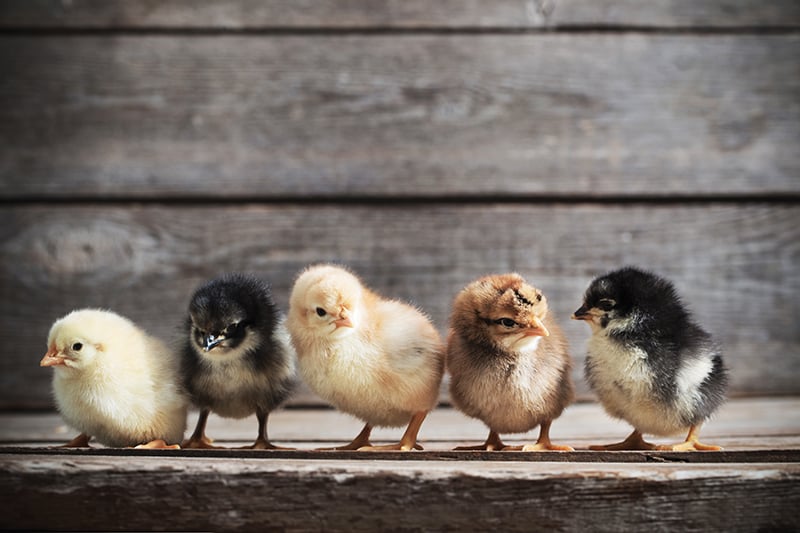Is It Legal To Have Farm Animals In The Charlotte City Limits?
5 Things to Know About Owning Chickens in the Metropolis

WHEN I BROUGHT three chicks home last leap, I expected fresh eggs to exist the biggest reward.
But Mildred, Barbara, and Mamie Lee—a Barred Rock, Columbian Wyandotte, and Easter Egger—take also become beloved family pets, following me around, perching on the porch swing, peering in the window and eating mealworms out of my easily.
My fascination with a backyard flock is non unique.
At Renfrow Hardware in Matthews, owner David Blackley has seen an increase in the number of chick purchases, and his chicken-keeping classes concenter sellout crowds.
"More people desire to know where their food comes from," he says, "and raising chickens is a real pleasure."
Cheeping chicks are hard to resist. Before getting caught upward in the cute gene, call up that chickens can live up to 10 years (though the boilerplate is three to four) and require constant care. You lot don't need a rooster to become eggs—good news because, although roosters are immune in Charlotte, their loud cock-a-doodle-do could attract the ire of neighbors and violate the local noise ordinance, resulting in a fine. Your chicks volition do fine without a human being. Here are a few things to go along in heed if you're considering keeping chickens at habitation:
Follow the rules: It'due south legal to keep chickens in Charlotte, but the city requires people to accept permits. Given that Charlotte-Mecklenburg Animal Care and Command issued just 41 permits in 2016, it seems that a lot of chicken coops are flying nether the radar.
Per city rules, there is a strict limit of 20 chickens per acre of state.
Cull your chickens: Chickens come in a range of colors, feather patterns, and sizes. Different breeds even lay dissimilar colored eggs. Ameraucanas lay blueish eggs; Buff Orpingtons lay brown eggs, and Leghorns lay white eggs.
Despite the differences, Blackley doesn't believe 1 breed is better than another. "At that place isn't a bad breed," he says. Chickens are flock animals, and will be happiest with feathered friends. Blackley recommends getting at to the lowest degree three hens.
Plume the nest: Chicks cannot exist left outside until all of their feathers come up in (at half-dozen weeks former). Before so, chicks need to be kept within in a bars expanse such as a domestic dog crate or plastic storage tub outfitted with a heat lamp. Blackley explains that this "brooder" is meant to supersede the warmth and shelter provided by a mother hen.
In one case chickens are fully feathered and prepare to go exterior, a secure coop is essential to protect them from coyotes, hawks, and other predators. Their coop should too provide shelter from the elements and nesting boxes where hens can lay eggs.
Provide chicken scratch: Chickens need constant access to fresh food and water.
Start chicks on a "starter-grower" feed and transition them to calcium-enriched pellets and scratch grains at vi months (when they start laying eggs). Delicacies such as mealworms, tomatoes, apple peels, and fifty-fifty warm oatmeal are favorite treats. Complimentary-range chickens will as well snack on insects and worms.
"You accept to be ready to take on the responsibility," Blackley says. "It's not hard, only information technology is a commitment."
Swallow upwardly! With the proper intendance, chickens will lay about 1 egg per day for up to ii years. Although egg production slows down as they become older, Blackley, who has 15 chickens, still gets the occasional egg from one of his nine-year-old hens.
Source: https://www.charlottemagazine.com/5-things-to-know-about-owning-chickens-in-the-city/
Posted by: mastersthearkly.blogspot.com

0 Response to "Is It Legal To Have Farm Animals In The Charlotte City Limits?"
Post a Comment